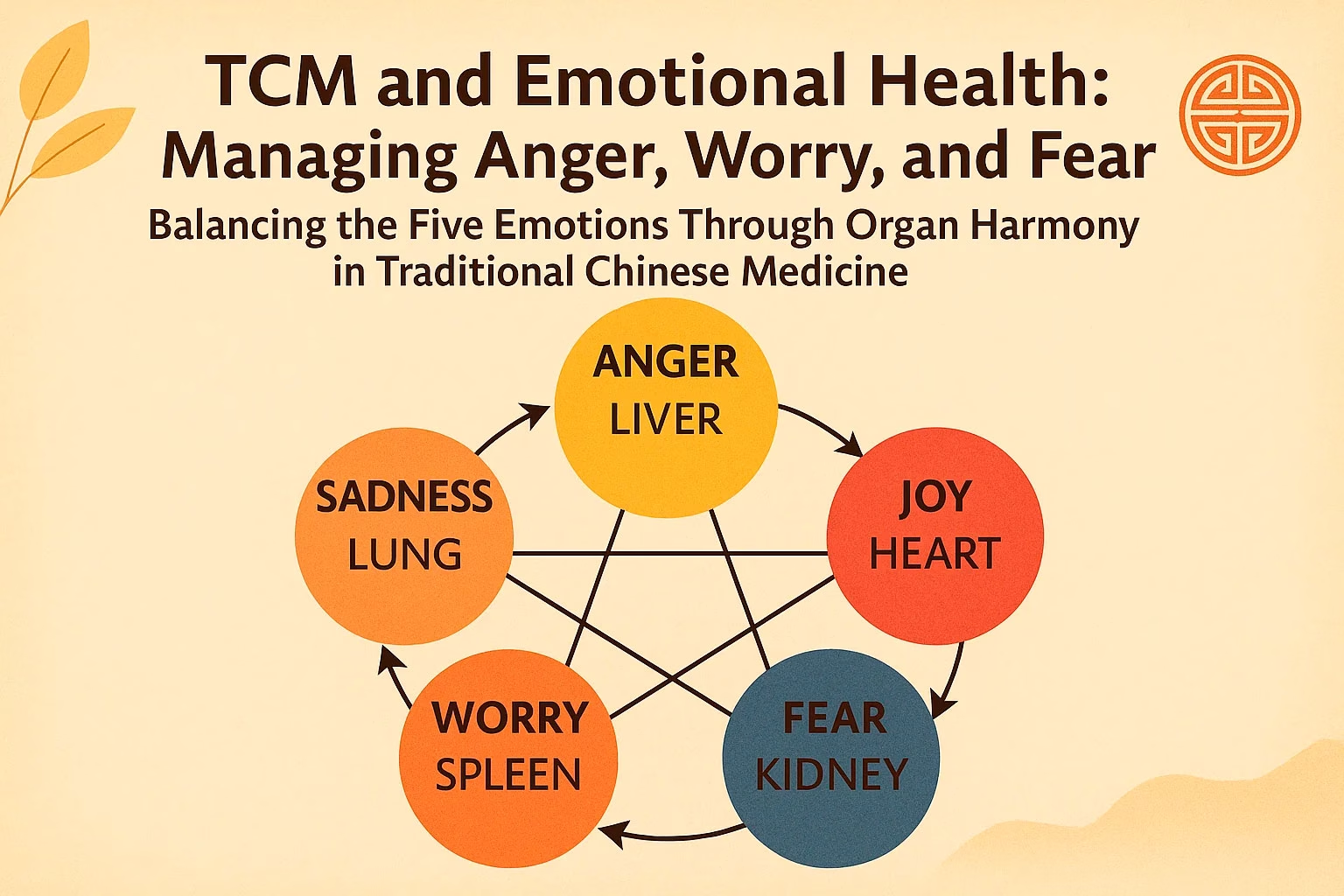Balancing the Five Emotions Through Organ Harmony in Traditional Chinese Medicine
🔶 Introduction
In Traditional Chinese Medicine (TCM), emotions are not just mental states—they are integral components of health, directly connected to the Five Zang organs and the flow of Qi and Blood. Prolonged or intense emotional states can disrupt internal balance and become pathogenic, contributing to the development of physical disease.
TCM views emotional well-being as a dynamic balance that must be maintained. Emotions such as anger, worry, fear, grief, and joy each correspond to specific organs. By understanding this emotional-organ relationship, TCM provides powerful tools to manage mood disturbances, promote mental clarity, and protect physical health.
This article focuses on three common emotional imbalances—anger, worry, and fear—and how TCM addresses them holistically through organ regulation, herbal therapy, lifestyle, and mind-body practices.
🔶 Emotions and Their Organ Associations
TCM aligns the Five Emotions (五志) with the Five Zang organs (五脏):
| Emotion | Organ | Effect of Excess |
|---|---|---|
| Anger | Liver | Qi rising or stagnation → headaches, irritability |
| Joy | Heart | Over-excitement → agitation, insomnia |
| Worry | Spleen | Qi knotting → fatigue, digestive issues |
| Sadness | Lung | Qi deficiency → fatigue, breathlessness |
| Fear | Kidney | Qi descending → incontinence, weakness |
Emotions are natural responses, but when intense, repressed, or chronic, they can disrupt the flow of Qi and Blood, weaken organ function, and become internal causes of disease.
🔶 Anger and the Liver: The Fire Within
In TCM, anger is closely related to the Liver, which governs the free flow of Qi throughout the body. When this flow is disrupted, Liver Qi stagnation or Liver Yang rising can occur.
Signs of Liver Qi Stagnation:
- Irritability, mood swings
- Hypochondriac pain
- PMS, breast tenderness
- Depression
Signs of Liver Fire or Yang Rising:
- Red eyes, headaches, dizziness
- Tinnitus, insomnia, hypertension
Treatment Strategies:
- Soothe the Liver, move Qi, and clear Heat if present.
Key Herbs and Formulas:
- Chai Hu (Bupleurum): Moves Liver Qi.
- Xiao Yao San: A famous formula for Liver Qi stagnation with Spleen deficiency.
- Long Dan Xie Gan Tang: Clears Liver Fire in more intense patterns.
Acupuncture Points:
- LV3 (Taichong): Moves Liver Qi, calms anger.
- GB34 (Yanglingquan): Benefits Liver and Gallbladder, reduces tension.
- Yintang: Calms the mind and soothes emotional stress.
🔶 Worry and the Spleen: Overthinking and Dampness
Worry and overthinking tax the Spleen, which is central to digestion and the transformation of food into Qi and Blood. Excessive mental activity weakens the Spleen, leading to Qi deficiency and Damp accumulation.
Symptoms of Spleen-Qi Weakness from Worry:
- Fatigue, heaviness
- Poor appetite, bloating
- Loose stools
- Mental fog, pensiveness
Treatment Strategies:
- Strengthen Spleen Qi, transform Damp, and calm the mind.
Key Herbs and Formulas:
- Ren Shen (Ginseng), Bai Zhu, Fu Ling: Tonify Spleen and drain Damp.
- Gui Pi Tang: Nourishes Spleen and Heart, ideal for fatigue and overthinking.
- Shen Ling Bai Zhu San: Strengthens Spleen and resolves Dampness.
Acupuncture Points:
- ST36 (Zusanli): Boosts Qi and strengthens digestion.
- SP6 (Sanyinjiao): Tonifies Spleen and calms the mind.
- PC6 (Neiguan): Harmonizes the center, relieves anxiety and tension.
🔶 Fear and the Kidney: The Root of Willpower
Fear is linked to the Kidneys, which govern Essence (Jing) and house the Zhi, or willpower. Excessive or chronic fear can cause Kidney Qi to descend, leading to both psychological and physical instability.
Signs of Kidney Weakness from Fear:
- Night sweats, anxiety
- Low back pain, knee weakness
- Tinnitus, dizziness
- Frequent urination or incontinence
- Lack of motivation or drive
Treatment Strategies:
- Tonify Kidney Qi and Jing, calm the spirit, and anchor Yang.
Key Herbs and Formulas:
- He Shou Wu, Shu Di Huang, Shan Zhu Yu: Nourish Kidney Yin and Jing.
- Zhen Wu Tang: Warms Kidney Yang and treats fear with cold signs.
- Tian Wang Bu Xin Dan: Nourishes Kidney and Heart Yin, for anxiety and insomnia.
Acupuncture Points:
- KD3 (Taixi): Tonifies Kidney Yin and anchors Yang.
- BL23 (Shenshu): Back-Shu point of Kidneys.
- GV4 (Mingmen): Warms Life Gate Fire and strengthens willpower.
🔶 Lifestyle and Emotional Balance in TCM
TCM encourages cultivating emotional resilience through lifestyle practices:
- Moderation in thought and behavior: Don’t dwell excessively on emotions.
- Routine physical activity: Promotes free Qi flow and relieves stagnation.
- Qigong, Tai Chi, and meditation: Anchor the Shen, soothe the Liver, and stabilize emotions.
- Dietary habits: Eat warm, nourishing foods to support Spleen and Kidneys; avoid greasy, cold, or spicy food that may agitate Liver Fire or create Dampness.
🔶 Conclusion
Emotional health is inseparable from physical health in Traditional Chinese Medicine. By recognizing the organ-emotion relationships, TCM provides a unique and effective framework to manage emotional disturbances like anger, worry, and fear. Whether through herbal formulas, acupuncture, or lifestyle adjustments, the goal is to restore harmony, allowing the emotions to flow freely and naturally—supporting both mental peace and physical vitality.
In TCM, to heal the mind, you must first harmonize the body.


发表回复